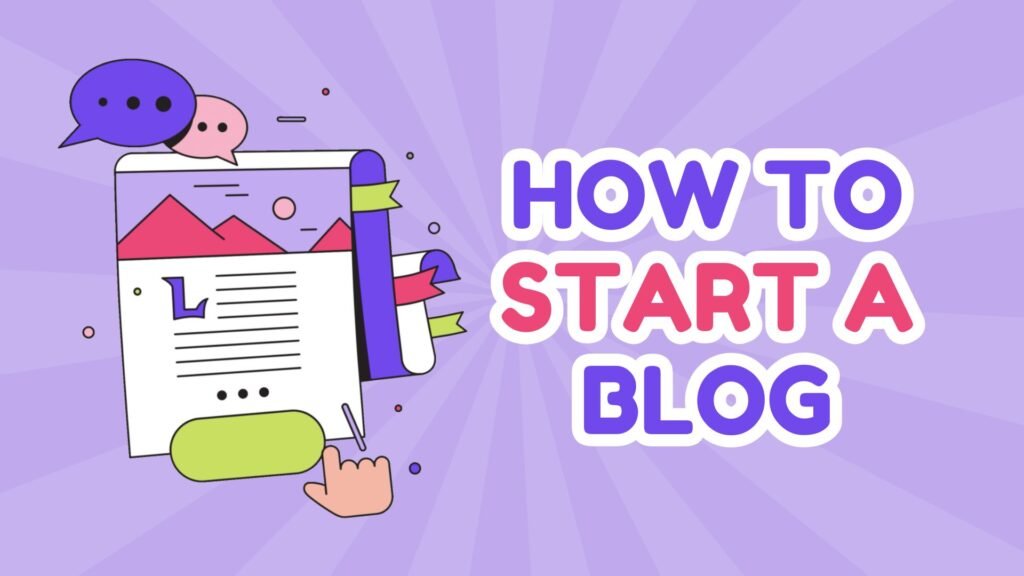Blogging has come a long way. Once considered a digital diary, it’s now a powerful tool for building a personal brand, earning a living, and sharing knowledge. In 2025, blogging isn’t just alive—it’s evolving. With AI-driven content, new SEO rules, and diversified monetization models, blogging remains one of the most accessible online ventures.
Whether you’re a high school student, a stay-at-home parent, or a budding entrepreneur, learning how to start blogging in 2025 – beginner’s full guide style can help you build your voice in the digital world.
Benefits of Starting a Blog Today
Why blog in 2025? Here are some compelling reasons:
- Multiple Income Streams: Ads, affiliate links, sponsored posts, courses, and memberships.
- Personal Branding: Blogging helps you stand out in your industry.
- Skill Development: You’ll learn writing, SEO, marketing, design, and analytics.
- Freedom & Flexibility: You can blog part-time or full-time, from anywhere.
Blogging is also therapeutic and empowering—it lets you express yourself while building a digital legacy.
Choosing Your Blog Niche Wisely
Your blog’s success largely depends on your niche. Choosing the right one involves balancing passion, expertise, and profitability.How to Choose a Niche:
- Evergreen vs. Trending: Evergreen topics (health, finance, parenting) have long-term value. Trending topics can spike traffic but may fade.
- Passion-Driven: If you love writing about it, you’re more likely to stay consistent.
- Demand & Competition: Use tools like Google Trends or Ubersuggest to analyze interest and saturation.
Examples of Profitable Niches in 2025:
| Niche | Subtopics |
|---|---|
| Personal Finance | Budgeting, Crypto, Side Hustles |
| Health & Wellness | Mental Health, Biohacking, Fitness |
| AI & Tech | Tools, Reviews, Tutorials |
| Sustainable Living | Eco Products, Minimalism, DIY |
Researching Your Audience and Market
Knowing your readers is essential.
- Create Reader Personas: Identify age, location, interests, challenges, and goals.
- Understand Search Intent: What questions are people asking in your niche?
- Tools to Use: Google Keyword Planner, SEMrush, AnswerThePublic, Reddit, Quora
Mapping your content to what your audience is searching for increases your chances of ranking and resonating.
Selecting the Right Blogging Platform
Your blogging platform is your foundation.
Top Platforms for 2025:
- WordPress.org: Most powerful and flexible (recommended for long-term bloggers)
- Wix: Drag-and-drop builder, ideal for design-focused beginners
- Substack: Great for newsletter-style blogs
- Ghost: Fast, clean, and writer-friendly
- Blogger: Simple but outdated
Choose based on your comfort level, growth plans, and content type.
Choosing a Domain Name and Hosting Provider
Tips for Choosing a Domain Name:
- Keep it short, catchy, and easy to spell
- Avoid hyphens or numbers
- Use keywords if possible (e.g., FitWithNina.com)
Recommended Hosting Providers:
| Hosting Provider | Pros |
|---|---|
| Bluehost | Easy WordPress setup, affordable |
| SiteGround | Excellent support and speed |
| Hostinger | Budget-friendly and reliable |
| WPX Hosting | Premium performance and security |
Setting Up Your Blog Step-by-Step
- Buy a domain and hosting
- Install your blogging platform (e.g., WordPress)
- Choose a theme or design template
- Install essential plugins
- Create your core pages (Home, About, Contact, Privacy)
- Start publishing!
Keep it simple at first. Focus on structure and navigation.
Designing a Professional-Looking Blog
Your blog’s appearance affects first impressions.
- Choose Clean, Fast-Loading Themes: Astra, Kadence, and GeneratePress are top choices.
- Add Your Branding: Use your logo, colors, and font styles consistently.
- Ensure Mobile Responsiveness: Over 60% of readers use mobile devices.
- Use Visuals Wisely: Stock images, infographics, and charts enhance user experience.
Essential Plugins and Tools for Bloggers
If you’re on WordPress, plugins are your best friends.
Must-Have Plugins in 2025:
- Rank Math SEO: Optimize your content for search
- WP Rocket: Speed up your site
- UpdraftPlus: Backup your blog
- MonsterInsights: Google Analytics made easy
- Akismet: Protect from spam comments
These tools keep your blog secure, visible, and user-friendly.
Creating High-Quality Content Consistently
Content is king—and consistency is queen.
Types of Blog Content:
- Pillar Posts: In-depth, evergreen content
- How-To Guides: Step-by-step tutorials
- Listicles: Easy-to-read formats like “10 Ways to Save Money”
- Case Studies & Reviews: Build credibility
Use a content calendar to stay organized. Aim for at least one post per week when starting.
Mastering SEO for Blogging in 2025
Search Engine Optimization (SEO) remains the backbone of blogging success. In 2025, Google’s algorithms favor quality, helpful content with strong user experience.
Key SEO Practices to Focus On:
- On-Page SEO: Optimize titles, headers, meta descriptions, and URLs. Use your focus keyword early in your content.
- Internal Linking: Help readers and search engines navigate your site.
- Mobile Optimization: Fast loading, responsive design is crucial.
- Core Web Vitals: Improve performance, interactivity, and visual stability.
- Schema Markup: Use structured data to enhance search listings.
SEO is a long game, but the right foundation now pays off in steady, organic traffic.
Leveraging AI Tools for Blog Growth
AI is a blogger’s secret weapon in 2025. From ideation to creation, automation makes content creation smarter and faster.
Popular AI Tools for Bloggers:
- ChatGPT & Jasper.ai: Writing assistance and ideation
- SurferSEO & NeuronWriter: SEO optimization
- Canva & Adobe Firefly: Visual content generation
- Pictory & Lumen5: Turn blogs into videos
AI doesn’t replace creativity—it enhances it. Use these tools to reduce your workload and scale faster.
Promoting Your Blog Effectively
No one will discover your amazing content unless you promote it.
Promotion Strategies:
- Social Media Marketing: Share posts on Instagram, LinkedIn, Pinterest, and Threads.
- Email Newsletters: Build an audience and retain visitors.
- Guest Blogging: Write for other websites in your niche.
- Content Syndication: Republish on Medium, Quora, or LinkedIn.
- SEO: Long-term organic reach through keyword-rich content.
Don’t rely on one channel—diversify your promotional efforts.
Monetizing Your Blog
Blogging can absolutely pay the bills (and then some). Once you have steady traffic, you can monetize in several ways:
Income Streams for Bloggers:
- Ad Revenue: Google AdSense, Ezoic, Mediavine
- Affiliate Marketing: Recommend products and earn a commission
- Sponsored Content: Brands pay for exposure
- Digital Products: Ebooks, courses, templates
- Memberships & Coaching: Offer premium content or services
Start with affiliate links or ads and build up as your audience grows.
Legal Considerations for Bloggers
To stay on the right side of the law:
- Privacy Policy & Terms Pages: Required for most blogs.
- Affiliate Disclosures: Always disclose paid relationships.
- Copyrights: Don’t use images or content without permission.
- GDPR Compliance: Protect user data and use cookie consent.
Being transparent builds trust with your audience.
Tracking Your Blog’s Performance
Use data to make informed decisions.
Key Metrics to Watch:
- Traffic Sources
- Bounce Rate
- Time on Page
- Top Performing Posts
- Conversion Rate
Tools like Google Analytics, Hotjar, and Ahrefs help you understand what’s working—and what’s not.
Common Blogging Mistakes to Avoid
Avoid These Pitfalls:
- Inconsistent Posting: Momentum matters.
- Ignoring SEO: You’ll miss organic traffic.
- Neglecting Design: Poor UX drives readers away.
- Over-Monetization: Too many ads can turn off readers.
- No Engagement: Respond to comments and emails.
Learning from others’ mistakes can save you months of frustration.
Staying Motivated and Scaling Your Blog
It’s easy to feel discouraged, especially early on. But consistency beats talent when it comes to blogging.
Tips for Staying on Track:
- Set Realistic Goals: Track milestones—not just money.
- Join Blogger Communities: Facebook groups, Discords, and Reddit are full of peers.
- Automate Repetitive Tasks: Use scheduling tools and AI assistants.
- Outsource When Ready: Hire writers, designers, or VAs as you grow.
Remember: every top blogger started as a beginner.
FAQs About Starting a Blog in 2025
1. Is blogging still profitable in 2025?
Absolutely. With diverse monetization options and global reach, blogging remains one of the best side or full-time income opportunities online.
2. How long before a blog makes money?
Most blogs start earning within 6–12 months if consistent content and SEO strategies are followed.
3. Do I need to know coding to blog?
No. Platforms like WordPress and Wix require zero coding skills.
4. How much does it cost to start a blog?
Typically $50–$150 for domain and hosting. Optional tools may increase costs.
5. Can I start a blog without showing my face?
Yes. Many successful bloggers remain anonymous using pen names or avatars.
6. How often should I post on my blog?
At least once a week is ideal when starting out, with quality prioritized over quantity.
Conclusion: Your Blogging Journey Starts Now
Now that you know how to start blogging in 2025 – beginner’s full guide, the only thing left is to take action. Blogging rewards those who show up consistently, stay curious, and provide value. It’s not just a side hustle—it’s a powerful platform for creativity, income, and impact.
So grab your domain, pick your niche, and write your first post. The internet is waiting for your voice.




